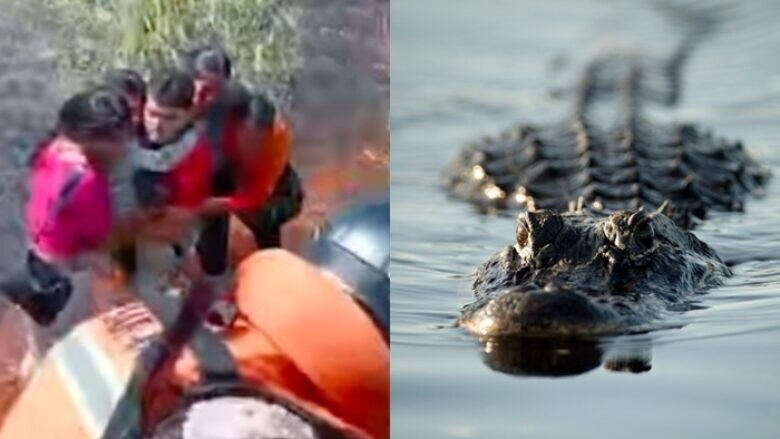
The dense, emerald labyrinth of the Bolivian Amazon, a realm of breathtaking biodiversity and lurking peril, recently played host to a remarkable tale of survival. Five individuals – three women, a child, and their intrepid 29-year-old pilot, Andrés Velarde – clung to life for a harrowing 36 hours in a swamp teeming with caimans and the silent threat of anacondas after their single-engine aircraft was forced into an emergency landing. Their improbable rescue, confirmed by local authorities in the Beni region, paints a vivid picture of human resilience against the raw power of nature.
The ill-fated flight originated from Baures, a remote town nestled 180 kilometers from Trinidad, the capital of the Beni department in northeastern Bolivia. Mid-journey, the small aircraft, a lifeline for connecting isolated communities in this vast and often inaccessible region, began to falter. Pilot Velarde, speaking with remarkable composure from his hospital bed, recounted the terrifying moments as the plane abruptly lost altitude. His desperate search for a suitable landing spot led him to a precarious clearing within a swampy area bordering a lagoon – a decision that, while saving them from a catastrophic crash, plunged them into a different kind of danger.
The immediate aftermath of the emergency landing left the five survivors stranded atop the overturned wreckage, their sanctuary a fragile island in a hostile environment. The air hung heavy with the humid scent of the swamp, a stark contrast to the more sinister aroma that would inadvertently become their unlikely ally: the pungent smell of kerosene leaking from the damaged aircraft.
As darkness descended on the Amazonian wetland, the true extent of their predicament became terrifyingly clear. "Crocodiles came within three meters of us," Velarde chillingly recalled. The waterways surrounding their makeshift refuge were patrolled by these apex predators, their reptilian eyes glinting in the murky water, their powerful jaws a constant threat. Adding to the primeval fear, Velarde also reported the unsettling sight of an anaconda, the legendary constrictor, slithering through the shadowy depths. Escape by water was an impossibility; every ripple held the potential for a deadly encounter.
Marooned and surrounded by danger, the survivors relied on a meager provision: harina de yuca, a coarse flour made from cassava root, a staple food in the region. This humble sustenance became their lifeline, providing the energy needed to endure the long hours of fear and uncertainty. "We couldn't drink water or move elsewhere because of the crocodiles," Velarde explained, highlighting the agonizing thirst and immobility imposed by their environment. The very elements necessary for survival – water and the ability to seek help – were now sources of mortal danger.
Their salvation arrived in the form of local fishermen, individuals intimately familiar with the intricate waterways and hidden dangers of the Amazon. Their timely discovery of the stranded group, after 36 grueling hours, was nothing short of miraculous. The fishermen, navigating the treacherous terrain, brought the survivors back to civilization, where they were promptly transported to a hospital for much-needed medical attention and the psychological relief of knowing their ordeal was over.
The Bolivian Amazon, while a treasure trove of ecological diversity, presents a formidable landscape for both its inhabitants and those who traverse it. The Beni region, with its expansive wetlands, meandering rivers, and dense rainforests, is a natural habitat for a plethora of wildlife, including formidable predators like black caimans (a larger and more aggressive relative of the crocodile), anacondas that can reach astonishing lengths, and stealthy jaguars. Emergency landings in such terrain are fraught with peril, and the survival of the five individuals underscores an extraordinary combination of luck, resilience, and perhaps, a touch of serendipity in the form of the kerosene's repellent properties.
Small aircraft serve a crucial role in connecting remote communities within the Bolivian Amazon, often bypassing days of arduous travel by river or rudimentary roads. However, the infrastructure supporting aviation in these isolated areas can be less developed, and safety regulations may not be as stringent as in more populated regions. Consequently, accidents, though not frequent, can have dire consequences, often compounded by the challenges of search and rescue operations in the dense and unforgiving environment. Past incidents have tragically highlighted the vulnerability of air travelers in this region and the desperate situations survivors can face while awaiting help, often under the watchful eyes of jungle predators.
The survival of Velarde and his passengers is being hailed as a testament to the human spirit's ability to endure extreme adversity. Their composure in the face of immediate danger, their reliance on limited resources, and the pilot's presence of mind in the moments leading up to and following the crash undoubtedly played crucial roles in their survival. The seemingly accidental deterrent provided by the leaking fuel offers a bizarre twist to their story, a reminder that even in the most dire circumstances, unexpected factors can influence the outcome.
Looking ahead, this incident is likely to prompt renewed scrutiny of aviation safety standards and emergency response capabilities in the Bolivian Amazon. The challenges of operating and regulating air travel in such a remote and environmentally sensitive region are significant, but the lives of its inhabitants and those who travel there depend on robust safety measures and efficient rescue protocols. Furthermore, the bravery and local knowledge of the fishermen who located and rescued the survivors deserve significant recognition, highlighting the vital role of community members in emergency situations within these isolated areas.
The harrowing 36-hour ordeal in the crocodile-infested swamp is more than just a dramatic news story; it is a powerful narrative of human vulnerability and resilience in the face of nature's raw power. It underscores the inherent dangers of the Amazonian wilderness while simultaneously celebrating the extraordinary will to survive and the unexpected kindness of strangers that ultimately led to the safe return of the five individuals from the brink of a truly terrifying fate. Their story will undoubtedly serve as a compelling reminder of the delicate balance between humanity and the natural world, and the remarkable capacity for survival that lies within us.
[Copyright (c) Global Economic Times. All Rights Reserved.]






























